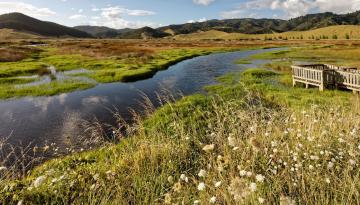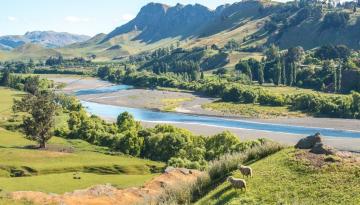
While regional councils celebrate millions of dollars in funding for local freshwater restoration projects, scientists are holding their applause.
The Government has announced a package of 23 projects across the country with more than 2000 jobs and worth $160 million, from the Jobs For Nature Fund that was announced in the Budget.
Labour says they will lead to immediate job creation and significant environmental outcomes.
But freshwater ecologist Dr Mike Joy, from Victoria University's governance and policy school, is not impressed.
"What's happening is they allow the pollution of our waterways and then think that we're going to be happy that they've given money to clean it up," Dr Joy said.
"It's just so pointless to try cleaning up something if you don't shut off the source of the problem. It's like buying more tea towels to soak up a pot that's boiling over on the stove instead of turning the gas down."
He said the projects, which had a key focus on wetlands and planting, showed scientific advice was being ignored.
Among the projects announced on Sunday was an $11m spend at Lake Horowhenua to "build a wetland complex" to reduce nitrogen levels in the heavily polluted lake.
The Government says it will create 45 jobs over five years.
Manawatu-Wanganui Regional Council natural resources manager Jon Roygard said the project would help to save horticulture jobs in the catchment.
"There's a lot of jobs that are operating inside that area, and this is a project that's to reduce the inputs into the lake and enable that productive land use to continue, while still enabling the overall water quality in the lake."
Roygard said the project was part of a bigger picture of trying to improve the water quality in the catchment.
But Dr Joy said the project was an example of plastering over the root of the problems as it still allowed pollution from farmland and wastewater discharges to continue.
"By planting around the lake when there's a catchment area that's 100 times bigger than that which is where the problem is coming from... ignoring that is going to achieve jobs for the short term, but that's the only thing it's going to achieve."
The Waikato is home to more heavily degraded waterways where the government is facing an uphill battle to clean them up.
The Waikato Regional Council has secured $5.5m from the fund for projects that include creating a green corridor along the Piako River and restoring habitat along a stream that feeds the Waihou River after trees were removed.
Council chairman Russ Rimmington was celebrating the news, as smaller regional projects were often hard to get off the ground due to the high cost to ratepayers.
"The funding is just not the normal Waikato River. We're thrilled that they're also looking at the lower Piako River and the wetlands in the Hauraki Gulf themselves, which is quite different to the Waikato heads that have been on the news so much."
He said the work would also support local contractors and businesses such as fencers, arborists, pest control specialists, nurseries and hardware supply stores.
University of Auckland environmental geographer Brendon Blue said the projects list was promising, but would not solve our land use problems, which had shifted the way sediment moved through our waterways.
Those problems had taken centuries to accumulate, so it would likely take just as long to purge the pollutants, he said.
"They are fundamentally fairly local projects, but it's going to be a piece by piece process of, river by river, fixing them up basically. It's going to be horrifically expensive and it's going to take a very long time."
Minister for the Environment, David Parker, was unavailable for an interview about the announcement.
RNZ


